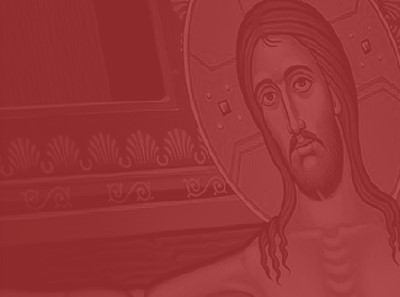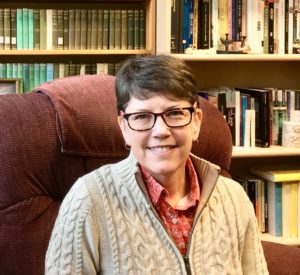
That seems an unusual concern for a finally-professed Dominican Sister celebrating her Silver Jubilee, but not when you consider the research project I’ve launched: “Redeeming Jesus: The Role of Scripture in the New Cosmology,” funded by a generous sabbatical research grant from the Louisville Institute.
Full disclosure here: my motives for this research are only partially the result of intellectual curiosity. I am by profession a New Testament scholar. As my dissertation director, Professor Margaret M. Mitchell once described her work, I am a “literary historian.” I plumb the depths of ancient history in search of the contextual meaning of a particular Greek phrase. I literally sift through the dust of archaeological sites in an attempt to find artifacts that add dimension to our biblical texts. I peruse the tomes of ancient and modern commentaries to draw insights for today. With the exception of my forays into archaeology and a brief stint as a junior high school science teacher, I am wholly without experience or sophisticated training in the sciences. The baseline motivation for my research is a concern about my job security as a biblical scholar. Let me explain.

If science is real (and it is!) and all is evolving (it continues to do so) and the universe is expanding then at a very base level creation is not complete. We’re still in process—all of us. What is the role of Jesus as “redeemer” if we have a different concept of “sin”? How do we, with our global vision, read our Scriptures written by inspired writers who believed the world to be flat? Is there a way to re-interpret and read the bible and Tradition in light of the new cosmology, not despite it? How do I not throw “the baby (Jesus) out with the (cosmological) bath water” to quote my research assistant, Rhonda?
In my preliminary research I came across a letter, written in in 1988, that has reached across the gulf of time to offer me a direction and encouragement. The author writes:
If the cosmologies of the ancient Near Eastern world could be purified and assimilated into the first chapters of Genesis, might not contemporary cosmology have something to offer to our reflections upon creation? Does an evolutionary perspective bring any light to bear upon theological anthropology, the meaning of the human person as the imago Dei, the problem of Christology – and even upon the development of doctrine itself? What, if any, are the eschatological implications of contemporary cosmology, especially in light of the vast future of our universe? Can theological method fruitfully appropriate insights from scientific methodology and the philosophy of science?
Questions of this kind can be suggested in abundance. Pursuing them further would require the sort of intense dialogue with contemporary science that has, on the whole, been lacking among those engaged in theological research and teaching. It would entail that some theologians, at least, should be sufficiently well-versed in the sciences to make authentic and creative use of the resources that the best-established theories may offer them. Such an expertise would prevent them from making uncritical and overhasty use for apologetic purposes of such recent theories as that of the “Big Bang” in cosmology. Yet it would equally keep them from discounting altogether the potential relevance of such theories to the deepening of understanding in traditional areas of theological inquiry.
The insightful analogy of the ancient near eastern cosmology and Genesis, the encouragement to be in dialogue with the sciences, and the admonition to do so thoughtfully and critically all calm my concerns. It would seem that Pope John Paul II, now “Saint,” in his Letter to Reverend George V. Coyne, S.J., director of the Vatican Observatory not only tread along this path before me, but encourages me and others to follow.
A note to commentators: I am a Catholic Christian scholar for whom the Gospel directs not only my teaching, but my actions and hopefully my speech. I look forward to your insights, but I ask that in the spirit of Christian charity and courteous discourse you write with love and civility. Hateful or vitriolic speak has no place in thoughtful dialogue.
“Let no evil talk come out of your mouths, but only what is useful for building up, as there is need, so that your words may give grace to those who hear” (Eph 4:29).
–Laurie Brink, O.P., Ph.D.
Professor of New Testament Studies
Catholic Theological Union
The work of moving theology into cosmology was done in the early church by the mystics and the desert mothers/fathers. Meister Eckhart OP tried to reclaim the Cosmological worldview of the early church, and was roundly trounced for it, ditto Pierre Teilhard de Chardin. The cosmological, mystical worldview of Christ is now being ressourced by Ilia Delio OFM (who carries Teilhard forward into the 21st century as a scientist, as did Kathleen Duffy, SSJ), Richard Rohr OFM (The Universal Christ), Matthew Fox (former OP, who still teaches Dominicanity), Mike Morrell, NT Wright, and an increasing number of Protestant writers and… Read more »
One of the benefits of this study is learning that these questions are not new. The theologians of the early church and the later mystics understood much of what we are only now realizing: the interconnectivity of all.
“What is the role of Jesus as “redeemer” if we have a different concept of “sin”?” An excellent question! Can we really look at a new born baby and think: “sinful creature”? How much of our interpretation of Jesus life and death comes from his early Jewish followers as they try to find meaning for Jesus’ traumatic murder within the framework of the Temple sacrifices. As I look back over 80 plus years, my life has changed as I matured in time, knowledge and experience. Relationships that have deepened, have also changed. The ones I’ve lost sight of remained static.… Read more »
Astronauts of the Spirit! Nice turn of phrase but I hope I don’t come across as a “space cadet”! Indeed, exploring a 21st century definition of “sin” seems an important first step in developing a mature Christology.
🙂 Not sure of meaning of “space cadet” ! I was thinking of astronauts who deeply study space and reflect on it’s meaning. I resonate with what Colleen Settles wrote below. The Divine Mystery indwells, and fills, all creation with love.
All Creation’s gifts hold all and yet nothing!The Devine breath is the Universe. We are held in a never ending cradle of love. No one part is greater than another. All that exists is Divine.
Thank you, Laurie, for joining this growing body of inquiry and study from your scholarly Scriptural perspective. I encourage you not to “fear” losing Jesús, but rather to anticipate a stronger and more dynamic relationship with this sacred and revolutionary divine and human being – foreshadowing our very own evolutionary call to divine Oneness. Without this type of study I fear, not the loss of Jesus, but the loss of the relevancy of our ancient wisdom sources. As a Dominican woman, your search for truth, even in the face of fear, is very needed and appreciated.
Bringing together the growing insights from science and the wealth of wisdom from our tradition will indeed help both our spirituality and our church remain relevant! It’s now a bit like learning a new language and vocabulary but a worthy task.